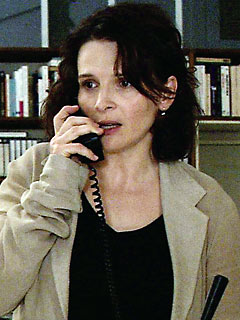
Binoche as Anne Laurent in “Caché.” (source)
I am quickly learning that Juliette Binoche is an amazing actress. Anybody who’s seen Bleu (Blue) from Krzysztof Kieslowski’s famous Trois couleurs (Three Colors) series could tell you that. And despite having a supporting role in Caché (Hidden), she shines like a star, nearly overshadowing actual star Daniel Auteuil.
Binoche plays Anne Laurent, the wife of Georges Laurent (Auteuil), who has been receiving threatening drawings and creepy video tapes that record Georges as he goes about daily activities. We follow the Laurents as they try to figure out who is recording their lives and how, and what the drawings mean. Binoche’s expressions are soaked in vulnerability as she worries about her husband, her son, and herself alike. But I’ve learned to expect such excellence from her. She is an amazing drama actress.
Unlike that of Binoche, Auteuil’s performance was completely unexpected. Before Caché, I had only seen him in comic roles – the bumbling Ugolin in Jean de Florette and Manon des Sources (Manon of the Springs); François Pignon, the too-straight-for-his-own-good lead man in Le placard (The Closet, a personal guilty pleasure film). So when I recognized him in Caché, with all its tension and drama, I naturally raised an eyebrow. But despite working in Binoche’s shadow, Auteuil gave his own powerhouse performance, delivering Georges Laurent’s neurosis and conflicted morals in such a way that we ping like pinballs between fully sympathizing and wanting to bash him over the head and not knowing which to feel. Both he and Binoche feel very real as Anne and Georges Laurent.
The supporting cast is also incredible. Maurice Bénichou delivers an amazingly sympathetic performance as Majid, a man of Arabic descent who Georges Laurent’s parents had adopted when Georges was only six years old. Walid Afkir only gets a couple of scenes as Majid’s son, but when he is onscreen, he steals the scene. (To go into detail about Majid and his son would be to risk spoiling significant portions of the movie.) And let’s not forget Lester Makedonsky, who is very convincing as the Laurents’ teenage son, Pierrot, who is obviously going through an emotional roller coaster.

Afkir as Majid’s son. (source)
Unfortunately, while the dialogue is captivating and the actors bring the script to life with great success, the editing is at best mediocre. In an attempt to capture the effect of the stalker’s monitoring cameras, the editors allowed for still shots that lasted several minutes without anything of evident significance happening. This works for the opening shot, in which we see little pockets of movement in the Laurents’ otherwise still neighborhood. But some of the other shots that use the same technique are so full of mundane activity, such as children leaving school, that we don’t know what to pay attention to and thus get bored after the first minute or two of the shot.
All the same, the dialogue and the actors carry the movie and do an excellent job. Anybody looking for a mind bending, if emotionally heavy thriller ought to find a DVD of Caché and prepare for a worthwhile Friday movie night.
